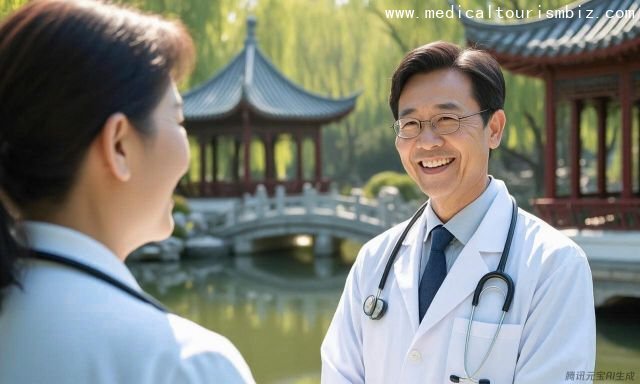JCI-Accredited Hospitals: Internationalized Service Standards for Medical Tourism in China

JCI (Joint Commission International) accreditation is indeed an important symbol and core driving force for China's medical tourism to enhance internationalized service standards. The following are the specific embodiment and impact of its value:
JCI Accreditation: A Standard for Global Medical Quality
1. Authority and Credibility
JCI is a global medical accreditation system recognized by the World Health Organization (WHO), representing the highest international medical service standards. Accredited Chinese hospitals prove that their quality, safety, and management are on par with the international top level.
2. Patient-centered core standards
JCI rigorously reviews patient safety (e.g., medication safety, infection control), standardization of medical processes, staff qualifications, facility management, etc., to ensure that patients can obtain consistent high-quality services in different cultural contexts.
How does JCI promote the internationalization of medical tourism in China?
1. Eliminate barriers to trust for international patients
- Language and Cultural Adaptation
Accredited hospitals are required to provide multi-language services (e.g., English, Arabic, Russian, etc.) and train their staff in cross-cultural communication skills (e.g., consultation and treatment procedures for foreign patients, religious and dietary requirements).
- International Insurance Direct Payment
JCI accreditation is a prerequisite for cooperation with international insurance companies (e.g., BUPA, Cigna), and supports direct billing for overseas patients to avoid cumbersome reimbursement.
2. Building the competitiveness of "Medical Destination
- High-end services
Typical examples include Beijing United Family Hospital (BJU) and Shanghai Jiahui International Hospital (SJIH), which provide one-stop services ranging from booking appointments, visa assistance, airport pickup, to rehabilitation and tourism.
- Precise Matching of Demand
For example, the Boao Lecheng International Medical Tourism Advance Zone in Hainan relies on JCI-accredited hospitals to attract Southeast Asian patients to receive advanced technologies such as targeted tumor therapy and stem cell therapy.
3. Driving the upgrading of the domestic medical system
- Forcing process optimization
In order to pass JCI accreditation, hospitals need to reconstruct the quality control system (e.g., reduce the error rate of surgery, optimize the emergency response time), and domestic patients will benefit simultaneously.
- Data Transparency
JCI requires the disclosure of data such as infection rate and readmission rate, which enhances the basis of decision-making for international patients.
JCI-accredited hospital practice cases
Shenzhen Genting Hospital: Providing Korean and Russian interpreters; bridging the demand for Korean plastic surgery.
Nanjing Mingji Hospital: Collaboration with Taiwan medical team, focusing on critical care referrals.
United Family Healthcare (UFH): direct payment of international insurance + family doctor-style general practice services.
Challenges and Future Paths
- Challenges
- High cost of accreditation (some hospitals have invested over $10 million), which is difficult for small and medium-sized organizations to afford.
- Cultural differences still need to be deepened: e.g., Middle Eastern patients have higher privacy requirements and need customized services.
- Optimization
- Regional synergy: establish JCI-accredited hospital clusters in medical tourism hotspots (Sanya, Kunming) to form a scale effect.
- Technology empowerment: Extend the service chain by utilizing AI translators and remote consultation.
- Policy support: Simplify the international patient visa process and open up cross-border medical data flow.
Conclusion: not only certification, but also systematic service upgrade
JCI accreditation is not the end point, but the starting point for China's medical tourism to integrate into the global value chain. Further steps are needed in the future:
1. differentiated positioning: combining TCM characteristics (e.g. acupuncture and rehabilitation), top specialties (e.g. Asia's leading organ transplant center).
2. Eco-integration: linking with hotels, travel agencies, and airlines to create a "medical care + health care + tourism" IP.
3. Continuous compliance: JCI re-assessment every 3 years requires hospitals to make continuous improvement rather than “one-time compliance”.
With JCI, China's medical tourism is shifting from a “price depression” to a “value plateau”, and the ultimate goal is to serve global patients with international standards, and at the same time feed the evolution and upgrading of the local medical system.
Document dated 2025-07-17 10:09 Modify
- Related Reading
- 1、Top 10 China Medical Tourism Destinations for International Patients
- 2、Why China Medical Tourism Is Trending in 2026
- 3、China Medical Tourism: Your Ultimate 2026 Guide
- 4、How much does it cost to see a doctor in China?
- 5、Can foreigners purchase health insurance in China?
- 6、Is Healthcare Cheap in China?
- 7、Is dental care free in China?
